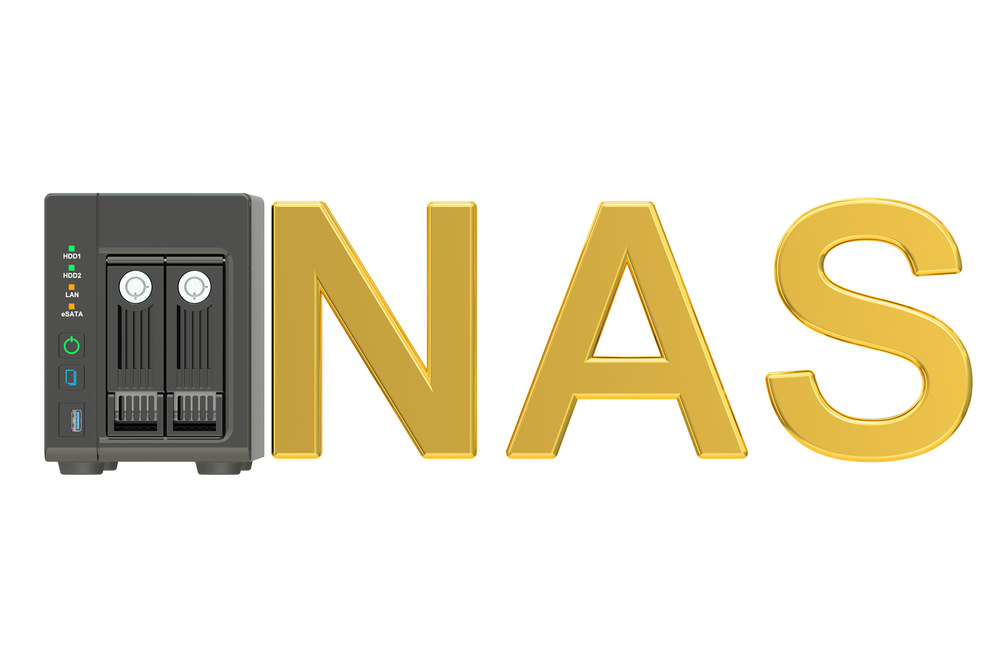Updated June 2023
NAS drives and DAS drives. You may well have heard these terms bandied around when you have been choosing your computer storage, but what is the difference between these two systems and what do you actually need for your PC?
Whether you need additional storage (for a growing movie library or so that you have a secure place to store important documents), both NAS and DAS offer great solutions Both DAS and NAS drives have their pros and cons, but it can be difficult to understand these, and which one is best suited to your needs. To help you out, we’ve put together this guide to NAS vs DAS servers. Let’s start with simple explanations of what DAS and NAS are…
Shop for NAS drives at Ebuyer.
What is a DAS (Direct Attached Storage)
DAS is computer storage that is directly linked to one computer or server, usually via a cable. This includes internal and external hard drives, SSDs or flash drives. Despite being the oldest storage method of the two, DAS I still the easiest and most affordable option. However, there are a number of downsides to DAS that might encourage you to choose a NAS server instead.
What is a NAS (Network Attached Storage)
NAS means storage devices which connect to a network, enabling the storage and access of data from a central location. This means that multiple computers/devices in a network can share the same storage space at once. Although NAS is more expensive and more complex to use than DAS, it does have a number of advantages for some purposes.
Why choose DAS?
So, when it comes to comparing DAS vs NAS, why should you opt for a DAS drive?
Simplicity
When comparing DAS vs NAS, DAS is the most basic level of storage. Your files are physically connected to the host computer, which gives the user a lot of advantages, as the content and device are easily accessible.
Cost
The cost of DAS vs NAS also tends to be more attractive.is correct whether talking about simple flash drives for small amounts of easily portable data right up to much larger terabyte hard drives. So, if you’re on a budget, a DAS drive might be better suited to you.
Flexibility
Unlike NAS drives, DAS drives do not require a network connection, meaning all the files and data can be accessed directly from the drive. This can be helpful if you’re in a location without internet access, on transport or for keeping secure and sensitive data. So, if you’re someone who’s always on-the-move, you might be better opting for a DAS rather than a NAS drive.
Versatility
DAS drives can be used to work with single devices as a back-up for a computer, as video storage for a TV or as a quick file transfer option for secure data. This makes them impressively versatile for anyone who uses their device for a multitude of purposes.
Security
Although DAS is technically a more basic format of storage compared to NAS, it can be inherently more secure. The user doesn’t need to access information via a network so there is less chance of data being accessed when it shouldn’t be. This can be very important for companies storing critical data or professionals with access to personal information.
Speed
In many instances, when comparing DAS vs server storage solutions, DAS is faster thanks to connections like USB and thunderbolt allowing tremendous direct performance of hundreds/thousands of Megabytes per second (MB/s).Browse data storage options at Ebuyer.
Why choose NAS?
So, now we understand the pros of DAS vs NAS, why might someone opt for a NAS drive instead?
Flexibility
NAS drives are designed to give the user more freedom to update, access and transfer files. As the NAS is connected to a network a user can access the NAS drive without needing to be physically connected. In effect this means wireless freedom – and in the generations of smartphones, tables and wireless media, the popularity of NAS is growing.
Multi-user
If you are a multi-user household or don’t want to be physically tied to a device, NAS drives allow for wireless connectivity over multiple devices at the same time. Expandable NAS drives give you the option to add more hard drives to the NAS unit. This means that users can easily upgrade storage without having to transfer everything across to a new and larger drive. Simply add more storage space if you run out.
NAS drives are a great option as a media archive, especially if you have a household full of wireless devices like tablet smart TVs and phones. You can simply stream movies, music and pictures direct from the storage onto your device without the need for messy wires and cables.
Customisation
When it comes to NAS vs DAS, NAS drives tend to offer greater customization options. For example, unlike DAS servers, NAS allows you to add more hard drives through configuration when needed.
Cost
Although when you compare DAS vs NAS, NAS servers do tend to be the more expensive option, they are still much cheaper than larger servers. In fact, entry-level NAS drives can be found for as little as £50.
DAS vs NAS servers
Ultimately, the main difference between NAS vs DAS servers is that DAS offers a more localised storage solution and so is simpler to use, less costly and more versatile. By contrast, NAS drives are better for when you require more storage as you can easily add multiple devices to your network.
At Ebuyer we stock a variety of different storage options, so take a browse of our website and see what’s on offer, including laptop storage and tablet storage.
























